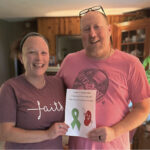
Jack is 62 years old and in relatively good health.
He doesn’t smoke or have a family history of heart disease. He’d like to lose a few pounds, but since he walks on the treadmill daily, that seems within reach. Now that snow is on the ground, someone needs to shovel his sidewalks. Twenty minutes into his task, he feels a sudden pressure in his chest and becomes short of breath.
Jill is 35 years old and the mother of two active children.
Outside of the home, Jill works as an accountant crunching numbers all day. When she gets home, it’s non-stop activity. Running the kids to practice, making dinner, and preparing for the next day leaves little time for exercise. One evening, she begins to notice a feeling similar to heartburn, coupled with nausea. Did she eat too much? Was that flu going around the office finally catching up to her?
Jack and Jill may be different genders and ages, but they both have something in common. Both are experiencing a heart attack.
Heart attacks, otherwise known as myocardial infarctions, remain the leading cause of death in men and women, but often they present differently. While heart disease is the number-one killer of women in the United States, too many women dismiss their symptoms as stress, aging or acid reflux. While chest pain usually is the number-one symptom of cardiac arrest, women need to be more aware of those unassuming, and yet other common indicators, such as indigestion, dizziness, nausea, weakness and a sense of impending doom or feelings of anxiety.
While not everyone experiences the same symptoms, the most common ones in both men and women occur in 50 percent of those experiencing a cardiac event. These include:
- Squeezing chest pain or pressure (It may go away and come back or intensify)
- Shortness of breath with or without chest pain
- Sweating
- Tightness in chest
- Pain spreading to shoulders, neck, arm or jaw
- Feeling of heartburn, stomach discomfort/indigestion with or without nausea and vomiting
- Sudden dizziness or brief loss of consciousness
- Cold sweats
The second most important factor related to a heart attack, aside from recognizing it could be happening, is the time it takes to respond.
Time is critical in the survival of and recovery from any cardiac event. If you think that you or someone else is having a heart attack, call 911 immediately to get to a hospital. Do not waste time calling your doctor or an Uber. Even worse, avoid the risk of an accident by driving yourself or the patient to the hospital.
Why call emergency medical services (EMS) for transportation? EMS provides cardiopulmonary resuscitation (CPR) and defibrillation if needed, conducts an electrocardiogram (EKG) and sends the results to the emergency department prior to the patient’s arrival.
Within the first few hours after a heart attack, there is a high risk of sudden fatal arrhythmia (irregular heartbeats). Those personnel or paramedics—equipped with the proper equipment and skills to revive you should your heart suddenly stop beating—will give you the best chance for surviving and avoiding permanent damage.
While you wait for an ambulance, provide the patient one aspirin to chew. Some heart attacks are caused by blood clots in heart arteries, and aspirin helps reduce these clots. Give CPR if the patient is not breathing. If you do not know CPR, learn it so you can save a life. Classes are offered in nearly every city or suburb and are either inexpensive or free.
Once at the hospital, a specialized team will be ready, and the right care will be put into action.
Robert E. Martin, M.D., is a cardiologist for UPMC Pinnacle. Find out more about heart health at www.UPMCPinnacle.com/Heart.





